2007 South Asian floods
- This article refers to the multiple concurrent floods in South Asia between 3 July and 15 August 2007 (Dartmouth Flood Observatory numbers DFO115, 121, 124, 129, 136, 143, 153, 155, 157 and 158). See other articles for other floods, e.g. the floods caused by Cyclone Yemyin, the China floods, the Sudan floods.
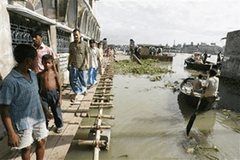 Residents of Keraniganj walk on a bridge on the bank of the flooded Buriganga river. | |
| Date | 3 July 2007 – 15 August 2007 |
|---|---|
| Location | India, Bangladesh, Nepal, Bhutan, Pakistan |
| Deaths | 2000 |
| Property damage | At least Rs. 500 millions (USD 12 million) |
The 2007 South Asian floods were a series of terrible floods in India, Nepal, Bhutan, Pakistan and Bangladesh. News Agencies, citing the Indian and Bangladeshi governments, place the death toll in excess of 2,000.[1] By 3 August approximately 20 million had been displaced[2] and by 10 August some 30 million people in India, Bangladesh and Nepal had been affected by flooding.[3]
UNICEF said that the situation "is being described as the worst flooding in living memory".[4]
Background
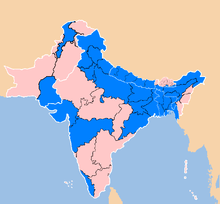
Rajpal Yadav of the Indian Meteorological Department reported that "we've been getting constant rainfall in these areas for nearly 20 days" due to abnormal monsoon patterns.[2] Flooding in Pakistan began during the landfall of Cyclone 03B in June 2007. Pakistani states Balochistan and Sindh were particularly affected.[5] Melting snow from the Himalayan glaciers increased the water levels of the Brahmaputra River.[6]
Areas affected in Bangladesh
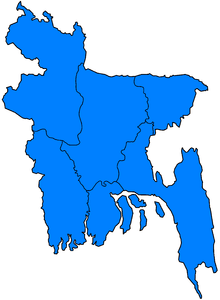
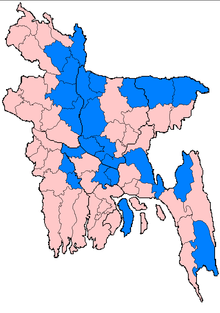
On 1 August, there was flooding on the Padma and Brahmaputra rivers.[7] By 3 August, the main highway connecting Dhaka to the rest of the country was impassable,[2] many districts were flood-affected[4] and 500,000 people had been marooned.[7] By 7 August an estimated 7.5 million people had fled their homes.[8] By 8 August more than 50,000 people had diarrhoea or other waterborne diseases[9] and more than 400,000 people were in temporary shelters.[10] By 11 August, flood deaths were still occurring in Bangladesh, the number of people with flood-related diseases was increasing[11] and about 100,000 people had caught dysentery or diarrhoea.[12] By 13 August, the confirmed death toll in Bangladesh was 405.[13]
By 15 August, five million people were still displaced, the estimated death toll was nearly 500,[14] and all six of Bangladesh's divisions were affected.
Dhaka
Districts in Dhaka that were affected by flooding on 21 July include Dhaka, Munshiganj, Rajbari, Madaripur, Shariatpur, Manikganj, Netrakona, Jamalpur and Tangail.[15]
Khulna
Districts in Khulna that were affected by flooding on 21 July include Magura and Narail.[15]
Rajshahi
Places in Rajshahi that were affected by flooding on 21 July include Sirajganj, Rangpur, Gaibandha, Bogra and Kurigram.[15]
Sylhet
Districts in Sylhet that were affected by flooding on 21 July include Sylhet, Sunamganj and Sherpur.[15]
Areas affected in Bhutan
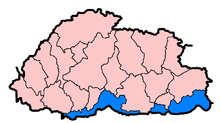
In Bhutan, the rain had led to landslides across the country, disrupting a number of major roads.[7]
Samdrup Jongkhar and Sarpang
By 5 August water was still above the warning level in the foothills of Bhutan.[16]
Areas affected in India
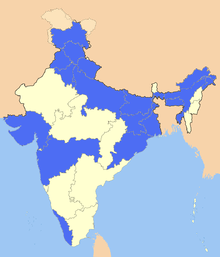
By 7 August in India, an estimated 13.7 million people had fled their homes.[8] According to the Indian government, the total cost of the monsoon this year, of which these floods are a part, is in excess of ₹1.3 billion (US$19 million) since 1 June[1] The full extent of the damage and number of lives lost may never be known.[17] president Pratibha Patil has condoled the loss of lives due to the floods.[18]
Arunachal Pradesh
Places in Arunachal Pradesh that were affected by flooding on 12 July include Lakhimpur, Chamuah Gaon, Nowboicha and Bharaluwa Gaon.[19]
Assam
In Assam, approximately 100,000 sought shelter in 500 government-sponsored relief camps. Millions of dollars' worth of crops were also destroyed.[2] 500,000 residents in Assam were displaced, and nineteen have been killed. On 1 August 2007, a teenage boy from Assam was shot by a police officer after a flood as survivors attacked a group of aid workers.[6]
Bihar and Uttar Pradesh
Bihar and Uttar Pradesh were the hardest hit states due to their high population density. By 3 August, the estimated death toll was 41 people, and 48 schoolgirls were marooned in a school in the Darbhanga district.[7][18] By 8 August, an estimated 10 million people in Bihar had been affected by flooding.[10] Army helicopters delivered food packets to Bihar residents and 180 relief camps were set up. By 10 August, aid workers in Bihar said the number of people with diarrhoea had jumped dramatically[20] and by 11 August, flood deaths were still occurring.[11]
Gujarat
On 8 August, Jamnagar reported 269 millimetres (10 inches) of rain[1] and fresh flooding was reported in Gujarat.[10] By the next day, nine people had been killed[1] and more than 400 villages were cut off.[21] By 10 August, more than 22,000 people were displaced[22] and health workers were disinfecting the worst-hit areas.[12]
Haryana
Haryana was affected by flooding on 12 August.[23]
Himachal Pradesh
On 14 August in Himachal Pradesh, a cloudburst caused a landslide that buried an entire village, killing an estimated 60 people.[24]
Jammu and Kashmir
Parts of Jammu and Kashmir, the part of Kashmir administered by India, that were affected by flooding on 12 August include Jammu city, Udhampur, Nikki Tawi, and lower Satwari.[23]
Jharkhand and West Bengal
While relief efforts have been concentrated elsewhere in India, the plight of the traditional region of Bengal (the flood plains of the Ganges-Brahmaputra-Meghna river delta and its tributaries) has been less reported. The Damodar and Kangsabati rivers overflowed their banks in late June, but levels finally began to fall as of 6 August.[25] The Durgapur Barrage and Kangsabati Dam (near Bankura) may be partly responsible. In North Bengal, the floods have caused economic damage also estimated in the millions of U.S. dollars (at least Rs. 500 million); and in Siliguri, flash floods have wiped away at least 100 houses on a single night (28 July 2007). The state government of West Bengal has set up facilities to house 50,000 refugees. As the flood has affected parts of the East Midnapore (Purba Medinipur) district, long-standing political divisions and conflicts have flared in the wake of the floods.
Kerala
Kerala was affected by flooding on 19 July.[26]
Maharashtra
By 3 August most streets were flooded in Mumbai and parts of Maharashtra were waterlogged.[27] On 7 August there was extensive flooding in the Gadchiroli district.[28]
Meghalaya
Places in Meghalaya that were affected by flooding on 12 July include the West Garo Hills district, the Tura and Rishipara areas.[19]
National Capital Territory of Delhi
New Delhi was also affected by the heavy rains.[5]
Orissa
On 8 August, fresh flooding was reported in Orissa.[10]
Punjab
Punjab was affected by flooding on 12 August.[23]
Tripura
Places in Tripura that were affected by flooding on 12 July include Udaipur, Amarpur and Sonamura.[15]
Uttarakhand
Uttarakhand, which was known as Uttaranchal until 2006, was affected by flooding on 12 August.[23]
Areas affected in Nepal
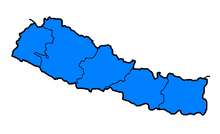

In Nepal, eighty-four people were killed by the floods and resulting landslides and 9,700 families were displaced. Twenty-eight of the country's seventy-five districts were affected,[5] in eleven of Nepal's fourteen zones and all five of Nepal's regions. Nepali officials were concerned about the spread of waterborne diseases.[7] By 7 August an estimated 333,500 people in Nepal were affected by flooding.[29]
Central Region
Janakpur Zone
Districts in the Janakpur Zone that were affected by flooding from 23 July include Dhanusha, Mahottari, Sindhuli, Sarlahi and Ramechhap.[30]
Narayani Zone
Districts in the Narayani Zone that were affected by flooding from 23 July include Chitwan and Rautahat.[30]
East Region
Koshi Zone
Districts in the Koshi Zone that were affected by flooding from 23 July include Sunsari and Morang.[30]
Mechi Zone
The Jhapa District in the Mechi Zone was affected by flooding from 23 July.[30]
Sagarmatha Zone
Districts in the Sagarmatha Zone that were affected by flooding from 23 July include Udayapur, Okhaldhunga, Saptari, Solukhumbu and Siraha.[30]
Far West Region
Mahakali Zone
Districts in the Mahakali Zone that were affected by flooding from 23 July include Baitadi and Darchula.[30]
Seti Zone
Districts in the Seti Zone that were affected by flooding from 23 July include Kailali, Bajhang and Bajura.[30]
Mid West Region
Bheri Zone
Districts in the Bheri Zone that were affected by flooding from 23 July include Banke, Bardiya and Surkhet.[30]
Rapti Zone
The Dang district in the Rapti Zone was affected by flooding from 23 July.[30]
West Region
Dhawalagiri Zone
The Baglung District in the Dhawalagiri Zone was affected by flooding from 23 July.[30]
Lumbini Zone
Districts in the Lumbini Zone that were affected by flooding from 23 July include Nawalparasi and Gulmi.[30]
Areas affected in Pakistan
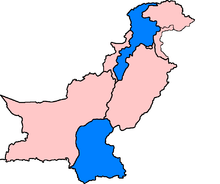
Sindh
By 11, 28 August people had died in rain-related accidents in Sindh.[11] By 12 August, flood waters were sweeping through villages in southern Pakistan.[31]
Khyber-Pakhtunkhwa
The Kohistan district of Khyber Pakhtunkhwa was affected by flooding on 12 August.[32]
See also
International response
By 15 August, non-governmental organisations, many with contributions from governments, that were contributing aid included Malteser International,[33] Deutsche Welthungerhilfe,[34] Direct Relief International,[35] World Concern,[36] Islamic Relief,[37] Church World Service,[38] International Save the Children Alliance,[39] Lutheran World Relief,[40] Medical Teams International,[41] Care International,[42] Catholic Relief Services,[43] British Red Cross Society,[44] World Vision,[45] Diakonie Emergency Aid,[46] David McAntony Gibson Foundation,[47] Caritas Internationalis,[48] Action by Churches Together (ACT),[49] Adventist Development and Relief Agency (ADRA),[50][51] Baptist World Aid (BWAid),[52] Mercy Corps,[53] and many others.
References
- 1 2 3 4 "South Asia floods death toll passes 2,000; India releases disaster relief". Forbes. AFX News Limited. 9 August 2007. Archived from the original on 7 October 2008. Retrieved 10 August 2007.
- 1 2 3 4 "Floods Leave Millions Homeless in India, Bangladesh". NPR. 3 August 2007. Retrieved 3 August 2007. Last accessed 3 August 2007
- ↑ "Floods show need for disaster risk reduction - UN". AlertNet. Reuters Foundation. 10 August 2007. Retrieved 15 August 2007.
- 1 2 "Millions of people across South Asia affected by monsoonal flooding". UNICEF. 3 August 2007. Archived from the original on 14 August 2007. Retrieved 8 August 2007. Last accessed 8 August 2007.
- 1 2 3 "Millions flee 'worst ever' floods". CNN. 3 August 2007. Archived from the original on 9 August 2007. Retrieved 3 August 2007. Last accessed 3 August 2007.
- 1 2 Hussain, Zarir (2 August 2007). "India floods leave children without food, water". Agence France-Presse. Archived from the original on 25 August 2007. Retrieved 4 August 2007. Last accessed 3 August 2007.
- 1 2 3 4 5 "Bangladesh, India floods leave thousands stranded". Reuters. 1 August 2007. Retrieved 3 August 2007. Last accessed 3 August 2007.
- 1 2 "Caritas Responds to Monsoon Devastation in South Asia". AlertNet. Reuters Foundation. 7 August 2007. Retrieved 15 August 2007.
- ↑ "Hunger, disease stalk children hit by South Asia floods". AlertNet. Reuters Foundation. 8 August 2007. Archived from the original on 25 August 2007. Retrieved 15 August 2007.
- 1 2 3 4 "Hunger, disease stalk children hit by South Asia floods". AlertNet. Reuters Foundation. 8 August 2007. Archived from the original on 25 August 2007. Retrieved 15 August 2007.
- 1 2 3 "Flood victims clash with police in India, 30 hurt". AlertNet. Reuters Foundation. 11 August 2007. Retrieved 15 August 2007.
- 1 2 "Bangladeshi hospital struggles to cope with flood victims". AlertNet. Reuters Foundation. 10 August 2007. Retrieved 15 August 2007.
- ↑ "B'desh cancels hospital leave to combat disease". AlertNet. Reuters Foundation. 13 August 2007. Retrieved 15 August 2007.
- ↑ "Bangladesh flood death toll nears 500, thousands ill". AlertNet. Reuters Foundation. 15 August 2007. Retrieved 15 August 2007.
- 1 2 3 4 5 Dartmouth Flood Observatory 2007 Global Register of Major Flood Events, flood number DFO129
- ↑ UNICEF Situation Report India floods - External 5 August 2007
- ↑ "Daily India". 29 July 2007. Archived from the original on 7 August 2007. Retrieved 7 August 2007.
- 1 2 "North India inundated". Hindustan Times. 3 August 2007. Retrieved 3 August 2007. Last accessed 3 August 2007.
- 1 2 Dartmouth Flood Observatory 2007 Global Register of Major Flood Events, flood number DFO121
- ↑ "Bangladeshi hospital struggles to cope with flood victims". AlertNet. Reuters Foundation. 10 August 2007. Retrieved 15 August 2007.
- ↑ "Flood rains hit new India regions". BBC News Online. BBC. 9 August 2007. Retrieved 15 August 2007.
- ↑ "Sickness spreads in S Asia floods". BBC. 10 August 2007. Retrieved 15 August 2007.
- 1 2 3 4 Dartmouth Flood Observatory 2007 Global Register of Major Flood Events, flood number DFO157
- ↑ "Sixty feared dead in landslide in Indian Himalayas". AlertNet. Reuters Foundation. 15 August 2007. Retrieved 15 August 2007.
- ↑ "India: Situation report - Deep depression/flood, 09 Jul 2007". Relief Web International. 26 July 2007. Archived from the original on 18 September 2007. Retrieved 7 August 2007.
- ↑ http://www.dartmouth.edu/~floods/Archives/2007sum.htm Flood Number 0124
- ↑ "Devastating floods hit South Asia". BBC News Online. BBC. 3 August 2007. Archived from the original on 8 August 2007. Retrieved 15 August 2007.
- ↑ "Time and money running out as floods continuedd to devastate south Asia". AlertNet. Reuters Foundation. 7 August 2007. Retrieved 15 August 2007.
- ↑ "NEPAL: Flood victims complain of lack of aid, slow delivery". AlertNet. Reuters Foundation. 7 August 2007. Retrieved 15 August 2007.
- 1 2 3 4 5 6 7 8 9 10 11 Dartmouth Flood Observatory 2007 Global Register of Major Flood Events, flood number DFO136
- ↑ "As South Asia Floods Recede, Urgent Aid Still Needed". AlertNet. Reuters Foundation. 12 August 2007. Retrieved 15 August 2007.
- ↑ Dartmouth Flood Observatory 2007 Global Register of Major Flood Events, flood number DFO158
- ↑ "Flood disaster in South Asia: Malteser International responds to flood in Pakistan". AlertNet. Reuters Foundation. 14 August 2007. Retrieved 15 August 2007.
- ↑ "Flood disaster in South Asia : Welthungerhilfe increases relief funds". AlertNet. Reuters Foundation. 13 August 2007. Retrieved 15 August 2007.
- ↑ "Direct Relief Supports South Asia Partners Dealing With Heavyer Flooding". AlertNet. Reuters Foundation. 10 August 2007. Retrieved 15 August 2007.
- ↑ "Bangladesh Disaster". AlertNet. Reuters Foundation. 10 August 2007. Retrieved 15 August 2007.
- ↑ "IR response to Bangladesh Floods". AlertNet. Reuters Foundation. 10 August 2007. Retrieved 15 August 2007.
- ↑ "CWS appeal: India floods (Assam, Bihar, Orissa and West Bengal)". AlertNet. Reuters Foundation. 10 August 2007. Retrieved 15 August 2007.
- ↑ "Save the Children Assists Children and Families Imperiled by South Asian Floods". AlertNet. Reuters Foundation. 10 August 2007. Retrieved 15 August 2007.
- ↑ "Lutheran World Relief Responding To Floods In India". AlertNet. Reuters Foundation. 9 August 2007. Retrieved 15 August 2007.
- ↑ "Medical Teams International Responds to South Asia Floods". AlertNet. Reuters Foundation. 8 August 2007. Retrieved 15 August 2007.
- ↑ "CARE launches £2.5 million appeal for South Asia floods". AlertNet. Reuters Foundation. 8 August 2007. Retrieved 15 August 2007.
- ↑ "CRS Commits $5 Million to South Asia Monsoon Efforts". AlertNet. Reuters Foundation. 8 August 2007. Archived from the original on 24 August 2007. Retrieved 15 August 2007.
- ↑ "News - Red Cross works in flood-stricken Asia". AlertNet. Reuters Foundation. 8 August 2007. Retrieved 15 August 2007.
- ↑ "South Asia floods - World Vision warns worse may yet be to come". AlertNet. Reuters Foundation. 8 August 2007. Retrieved 15 August 2007.
- ↑ "Diakonie Katastrophenhilfe stellt weitere 250.000 Euro bereit". AlertNet. Reuters Foundation. 8 August 2007. Archived from the original on 12 September 2007. Retrieved 15 August 2007.
- ↑ "GlobalMedic responds to Bangladesh Floods". AlertNet. Reuters Foundation. 7 August 2007. Retrieved 15 August 2007.
- ↑ "Caritas Responds to Monsoon Devastation in South Asia". AlertNet. Reuters Foundation. 7 August 2007. Retrieved 15 August 2007.
- ↑ "ACT Rapid Response Payment for Floods in West Bengal, India". AlertNet. Reuters Foundation. 7 August 2007. Retrieved 15 August 2007.
- ↑ "Flood Survivors in Southeast Asia Receive Desperately Needed Aid from ADRA". AlertNet. Reuters Foundation. 6 August 2007. Retrieved 15 August 2007.
- ↑ "Hungry South Asia flood victims fight over food". AlertNet. Reuters Foundation. 6 August 2007. Retrieved 15 August 2007.
- ↑ "Asia Flood Appeal - August 2007". AlertNet. Reuters Foundation. 6 August 2007. Retrieved 15 August 2007.
- ↑ "Mercy Corps Responds To South Asia Flooding". AlertNet. Reuters Foundation. 3 August 2007. Retrieved 15 August 2007.
External links
| Wikimedia Commons has media related to 2007 South Asian floods. |
- Dartmouth Flood Observatory 2007 Global Register of Major Flood Events
- British Red Cross-Asia Floods Appeal Give to the Asia Floods Appeal